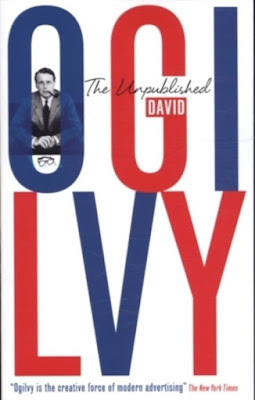 |
Who is David Ogilvy: Am sure you've heard of him. He happens to have built the tenth biggest ad agency in the world and is popularly known as the father of advertising.
What is the book about: It's a collection of some of his timeless and noteworthy communications, made in both public and private, throughout his career in the form of short and crisp memos, letters, speeches, notes, interviews et al.
Why does it deserve more than just a read:
To know of his way of expressing and the wit and wisdom that comes along with it. His style had been frank, simple, to the point, curt, short, blunt, candid and admirable. You'd laugh out loud while reading some of those.
It's a light and engaging read. You'd finish it in 'bout couple of hours. So, that makes it a high RoI ( return on investment) read :-).
There are several nuggets of wisdom on, creativity, hard work, business acumen, leadership, management and being humane, just to name a few. If you have a taste for creative writing, you're going to like the book.
Here are just a few snippets from the book, that struck a chord with me.. Am sure every reader would find his/her own nuggets of wisdom, joy and more in the book.
On Writing :
The better you write, the higher you go in Ogilvy & Mather. People who think well, write well.
Woolly minded people write woolly memos, woolly letters and woolly speeches.
Good writing is not a natural gift. You have to learn to write well. Here are 10 hints:
- Read the Roman-Raphaelson book on writing. Read it three times.
- Write the way you talk. Naturally.
- Use short words, short sentences and short paragraphs.
- Never use jargon words like reconceptualize, demassification, attitudinally, judgmentally. They are hallmarks of a pretentious ass.
- Never write more than two pages on any subject.
- Check your quotations.
- Never send a letter or a memo on the day you write it. Read it aloud the next morning — and then edit it.
- If it is something important, get a colleague to improve it.
- Before you send your letter or your memo, make sure it is crystal clear what you want the recipient to do.
- If you want ACTION, don’t write. Go and tell the guy what you want.
From an address to his heads of departments on leadership -
- Don’t overstaff your departments. People enjoy life most when they have the most work to do.
- Set exorbitant standards, and give your people hell when they don’t live up to them. There is nothing so demoralizing as a boss who tolerates second-rate work.
- When your people turn in an exceptional performance, make sure they know you admire them for it.
- Don’t let your people fall into a rut. Keep leading them along new paths, blazing new trails. Give them a sense of adventurous pioneering.
- Do your best to educate your people, so that they can be promoted as rapidly as possible.
- Delegate. Throw your people in over their heads. That is the only way to find out how good they are.
- Seek advice from your subordinates, and listen more than you talk.
- Above all, make sure that you are getting the most out of all your people. Men and women are happiest when they know that they are giving everything they’ve got.
- High standards of personal ethics.
- Big people, without pettiness.
- Guts under pressure, resilience in defeat.
- Brilliant brains — not safe plodders.
- A capacity for hard work and midnight oil.
- Charisma — charm and persuasiveness.
- A streak of unorthodoxy — creative innovators.
- The courage to make tough decisions.
- Inspiring enthusiasts — with trust and gusto.
- A sense of humor.
A few weeks ago, I asked you to send me the names of anybody on your staff who might qualify to become a Creative Director.
Twenty of you sent me a total of 49 names.
One of you sent me six names—his entire creative staff, I suspect; a charitable fellow.
Eleven of you told me that you have nobody who could qualify to become a Creative Director. You have problems. Something wrong with your hiring methods?
Ten of you have not answered. Bastards.
And that was just a few of the many notes I liked and enjoyed reading in the book. More than just worth the read :-).
Happy reading..

